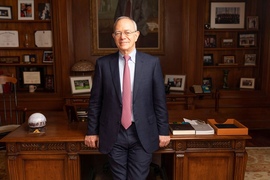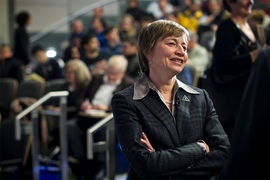No U.S. strategy to respond to competition from China will succeed unless it includes increased investment in research, a concerted effort to attract more students to key research fields, and a more creative approach to turning ideas into commercial products, MIT President L. Rafael Reif said in congressional testimony on Wednesday, Feb. 26.
Reif spoke at a hearing of the House Ways and Means Committee on “U.S.-China Trade and Competition.”
“Whatever else the U.S. does to counter the challenges posed by China, we must increase our investment in research in key technology areas, and we must enhance our capacity to get the most out of that investment,” he told the panel. “U.S. strategy is unlikely to succeed if it is merely defensive; to stay ahead, the U.S. needs to do more to capitalize on our own strengths.”
Reif’s Capitol Hill appearance came immediately after he delivered an opening talk at a National Academy of Sciences (NAS)_event commemorating the 75th anniversary of “Science, The Endless Frontier,” a 1945 report to U.S. President Harry S. Truman that is seen as the founding document of the post-World War II research system in the U.S. The report was written by the late Vannevar Bush, who had a long career at MIT, including service as the Institute’s vice president and dean of engineering.
At both the NAS and on Capitol Hill, Reif called for a “visible, focused, and sustained” federal program that would increase funding for research and target the increase at key technologies, such as artificial intelligence, quantum computing, and advanced communications.
“The U.S. lacks an effective, coordinated way to target research toward specific areas and funding has fallen far behind what’s needed to stay ahead of our competitors,” Reif told Congress. “One promising proposal is to create a new directorate at the National Science Foundation with that mission, and giving that new unit the authority to be run more like the Defense Advanced Research Projects Agency (DARPA).”
Reif also said that attracting top talent is another essential element of a successful strategy. “At the university level, that requires two parallel tasks — attracting top U.S. students to key fields, and attracting and retaining the best researchers from around the world,” he said.
Specifically, he called for new programs to offer federal support to undergraduates, graduate students, and postdocs who are willing to study in fields related to key technologies. He also said foreign students who receive a U.S. doctorate should immediately be given a green card to settle in the U.S., and he warned against anti-immigrant rhetoric.
Finally, Reif said the U.S. needs to experiment with ways to speed the transition of ideas from lab to market. He called for new ways to de-risk technologies and to create more patient capital, and suggested that the Ways and Means Committee, which has jurisdiction over tax policy, should look at tax policies to create incentives for longer-term investment and to foster more university-industry cooperation.
“The U.S. edge in science and technology has been a foundation for U.S. security, prosperity, and quality of life,” Reif said, in conclusion. “But that edge has to be regularly honed; it is not ours by right or by nature. We can best sharpen it with a strategy founded on confidence in ourselves, not fear of others.”
Two weeks ago, Vice President for Research Maria Zuber delivered a similar message to Congress, in testimony before the House Permanent Select Committee on Intelligence on how to improve the intelligence services’ access to science and technology.
Zuber said that to help the intelligence services, the U.S. needs to capitalize on its strengths, which she said include “world-class universities, an open research system, and the ability to attract and retain top talent from around the world.”
Like Reif, Zuber highlighted a proposal to create a new technology directorate at the National Science Foundation, as well as the need to attract talent domestically and from abroad. She also cited MIT’s AI Accelerator — a cooperative project between MIT and the U.S. Air Force — as the kind of cooperative work that the intelligence services could foster.
In her testimony, Zuber emphasized the need to maintain an open U.S. research system: “The U.S. faces new challenges and competitors,” she said, “but we are well-placed to succeed if we get the most from our unrivaled strengths.”










